2016年高考课标卷押题卷三答案1
2016高考全国卷卷Ⅲ试题及答案

2016年普通高等学校全国统一招生考试新课标Ⅲ卷语文试题一、现代文阅读(9分,每小题3分)阅读下面的文字,完成1~3题。
文学中有历史。
当今历史学家大都认为,没有什么文献资料不是史料,不但文学作品,即如佛经、道藏、信札、家谱、账本、碑铭等也无一不是,而且随着史学研究领域的拓展,史料范围还在不断扩大。
从“三言二拍”里可以看到晚明市井生活的真实面貌,这对于研究社会史的人几乎是一个常识。
陈寅恪以诗证史,也为大家所熟悉。
但在“五四”以前,史料范围并非如此宽泛,文学作品在大多数史学家眼里也并非史料,有些文献到底属于文学还是史学,一两千年来都没有一致的看法。
神话传说就是如此,其中相当突出的例子是《山海经》。
神话传说是文学,史前时代,无文字可征,只有传说,暂当历史。
三皇五帝至今未曾坐实,但“炎皇子孙”已经成为口头语,甚至成为历史共识。
新的传说还会不断产生,能否成史颇为可疑,但以神话传说研究历史,却是一种重要的方法。
在历史上,《山海经》究竟应归于文学还是史学,曾是死结。
王国维《古史新证》说“而疑古之过,乃并尧、舜、禹之人物而变疑之,其于怀疑之态度及批评之精神不无可取,然惜于在于史材料未尝为充分之处理也。
”这些古史材料就包括《山海经》《穆天子传》等文献。
在《汉书·艺文志》里,《山海经》列于数术类。
此后该书在目录学里的角色转换过几次,《隋书·经籍志》将《山海经》列于史部地理类,也就是将它看成史书了。
历史是讲真实的,《山海经》一般被视为荒诞不经,连司马迁写《史记》都不敢采用。
虽然《山海经》里平实的山川地理内容应归于史部,但其中大量的神话故事却显然有悖信史,所以清人编《四库全书》,言其“侈谈神怪,百无一真,是直小说之祖耳”,将其改列于子部小说家类。
这个死结直到“五四”以后才大致解开。
解开的途径有二:一是将《山海经》分而治之,不把它看作一部成于一人一时之书,神话归神话,历史归历史;二是神话中也有历史的成分在,仍可以之证史或补史。
2016届(新课标Ⅲ卷)高考原创押题预测卷 英语(解析版)

绝密★启用前2016年高考原创押题预测卷【新课标Ⅲ卷】英语本试卷分第Ⅰ卷(选择题)和第Ⅱ卷(非选择题)两部分。
考试结束后,将本试卷和答题卡一并交回。
第Ⅰ卷注意事项:1.答第Ⅰ卷前,考生务必将自己的姓名、准考证号填写在答题卡上。
2.选出每小题答案后,用铅笔把答题卡上对应题目的答案标号涂黑。
如需改动,用橡皮擦干净后,再选涂其他答案标号。
不能答在本试卷上,否则无效。
第一部分听力(共两节,满分30分)做题时,先将答案标在试卷上。
录音内容结束后,你将有两分钟的时间将试卷上的答案转涂到答题卡上。
第一节(共5小题;每小题1.5分,满分7.5分)听下面5段对话。
每段对话后有一个小题,从题中所给的A、B、C三个选项中选出最佳选项,并标在试卷的相应位置。
听完每段对话后,你都有10秒钟的时间来回答有关小题和阅读下一小题。
每段对话仅读一遍。
1. What will the man do on May 21?A. Attend a wedding.B. Go to a party.C. Take a vacation.2. What do we know about Mr Smith?A. He has been dismissed.B. He has been late for work.C. He will be hired by Mrs Brown.3. Where does the conversation probably take place?A. In a shop.B. At a restaurant.C. In a hotel.4. Why is the woman in a hurry?A. She has to fetch the paper.B. She has left her car key home.C. The exam will begin in half an hour.5. What does the man mean?A. He is running out of money.B. The woman should save some money.C. The woman spends a lot on designer clothes.第二节听下面5段对话或独白。
2016年全国统一高考语文试卷(新课标ⅲ)(含解析版)

2016年全国统一高考语文试卷(新课标Ⅲ)一、现代文阅读(9分,每小题9分)1.(9分)阅读下面的文字,完成1~3题。
文学中有历史。
当今历史学家大都认为,没有什么文献资料不是史料,不但文学作品,即如佛经、道藏、信札、家谱、账本、碑铭等也无一不是,而且随着史学研究领域的拓展,史料范围还在不断扩大。
从“三言二拍”里可以看到晚明市井生活的真实面貌,这对于研究社会史的人几乎是一个常识。
陈寅恪以诗证史,也为大家所熟悉。
但在“五四”以前,史料范围并非如此宽泛,文学作品在大多数史学家眼里也并非史料,有些文献到底属于文学还是史学,一两千年来都没有一致的看法。
神话传说就是如此,其中相当突出的例子是《山海经》。
神话传说是文学,史前时代,无文字可征,只有传说,暂当历史。
三皇五帝至今未曾坐实,但“炎皇子孙”已经成为口头语,甚至成为历史共识。
新的传说还会不断产生,能否成史颇为可疑,但以神话传说研究历史,却是一种重要的方法。
在历史上,《山海经》究竟应归于文学还是史学,曾是死结。
王国维《古史新证》说“而疑古之过,乃并尧、舜、禹之人物而变疑之,其于怀疑之态度及批评之精神不无可取,然惜于在于史材料未尝为充分之处理也。
”这些古史材料就包括《山海经》《穆天子传》等文献。
在《汉书•艺文志》里,《山海经》列于数术类。
此后该书在目录学里的角色转换过几次,《隋书•经籍志》将《山海经》列于史部地理类,也就是将它看成史书了。
历史是讲真实的,《山海经》一般被视为荒诞不经,连司马迁写《史记》都不敢采用。
虽然《山海经》里平实的山川地理内容应归于史部,但其中大量的神话故事却显然有悖信史,所以清人编《四库全书》,言其“侈谈神怪,百无一真,是直小说之祖耳”,将其改列于子部小说家类。
这个死结直到“五四”以后才大致解开。
解开的途径有二:一是将《山海经》分而治之,不把它看作一部成于一人一时之书,神话归神话,历史归历史;二是神话中也有历史的成分在,仍可以之证史或补史。
2016年英语高考试题新课标Ⅲ卷(含答案解析)
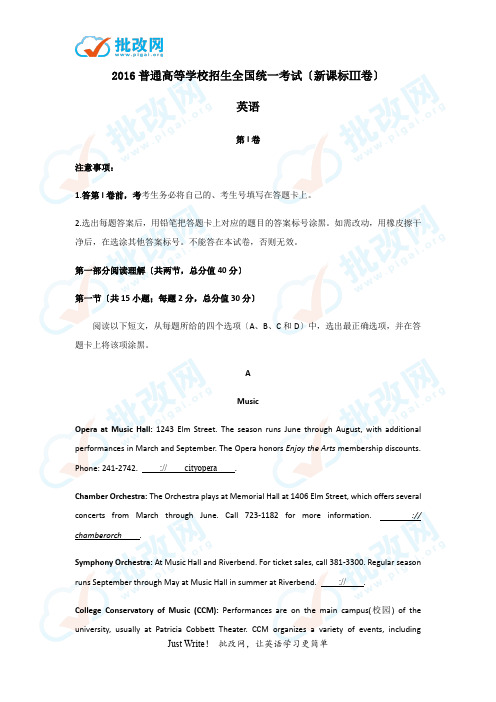
2016普通高等学校招生全国统一考试〔新课标Ⅲ卷〕英语第I卷注意事项:1.答第I卷前,考考生务必将自己的、考生号填写在答题卡上。
2.选出每题答案后,用铅笔把答题卡上对应的题目的答案标号涂黑。
如需改动,用橡皮擦干净后,在选涂其他答案标号。
不能答在本试卷,否则无效。
第一部分阅读理解〔共两节,总分值40分〕第一节〔共15小题;每题2分,总分值30分〕阅读以下短文,从每题所给的四个选项〔A、B、C和D〕中,选出最正确选项,并在答题卡上将该项涂黑。
AMusicOpera at Music Hall: 1243 Elm Street. The season runs June through August, with additional performances in March and September. The Opera honors Enjoy the Arts membership discounts. Phone: 241-2742. :// cityopera .Chamber Orchestra: The Orchestra plays at Memorial Hall at 1406 Elm Street, which offers several concerts from March through June. Call 723-1182 for more information. :// chamberorch .Symphony Orchestra: At Music Hall and Riverbend. For ticket sales, call 381-3300. Regular season runs September through May at Music Hall in summer at Riverbend. :// .College Conservatory of Music (CCM): Performances are on the main campus(校园) of the university, usually at Patricia Cobbett Theater. CCM organizes a variety of events, includingperformances by the well-known LaSalle Quartet, CCM’s Philharmonic Orchestra, and various groups of musicians presenting Baroque through modern music. Students with I.D. cards can attend the events for free. A free schedule of events for each term is available by calling the box office at 556-4183. :// .Riverbend Music Theater: 6295 Kellogg Ave. Large outdoor theater with the closest seats under cover (price difference).Big name shows all summer long! Phone:232-6220. :// riverbendmusic .1.Which number should you call if you want to see an opera?A. 241-2742.B. 723-1182.C. 381-3300.D. 232-6220.2.When can you go to a concert by Chamber Orchestra?A. February.B. May.C. August.D. November.3.Where can students go for free performances with their I.D. cards?A. Music Hall.B. Memorial Hall.C. Patricia Cobbett Theater.D. Riverbend Music Theater.4.How is Riverbend Music Theater different from the other places?A. It has seats in the open air.B. It gives shows all year round.C. It offers membership discounts.D. It presents famous musical works.【答案】1.A2.B3.C4.A1.A细节理解题。
2016年英语高考新课标III卷(完美版,含答案)
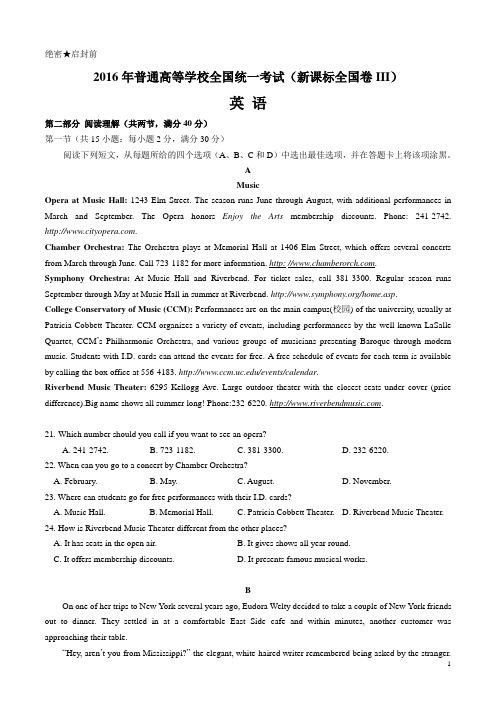
绝密★启封前2016年普通高等学校全国统一考试(新课标全国卷III)英语第二部分阅读理解(共两节,满分40分)第一节(共15小题:每小题2分,满分30分)阅读下列短文,从每题所给的四个选项(A、B、C和D)中选出最佳选项,并在答题卡上将该项涂黑。
AMusicOpera at Music Hall: 1243 Elm Street. The season runs June through August, with additional performances in March and September. The Opera honors Enjoy the Arts membership discounts. Phone: 241-2742. .Chamber Orchestra: The Orchestra plays at Memorial Hall at 1406 Elm Street, which offers several concerts from March through June. Call 723-1182 for more information. .Symphony Orchestra: At Music Hall and Riverbend. For ticket sales, call 381-3300. Regular season runs September through May at Music Hall in summer at Riverbend. /home.asp.College Conservatory of Music (CCM): Performances are on the main campus(校园) of the university, usually at Patricia Cobbett Theater. CCM organizes a variety of events, including performances by the well-known LaSalle Quartet, CCM’s Philharmonic Orchestra, and various groups of musicians presenting Baroque through modern music. Students with I.D. cards can attend the events for free. A free schedule of events for each term is available by calling the box office at 556-4183. /events/calendar.Riverbend Music Theater: 6295 Kellogg Ave. Large outdoor theater with the closest seats under cover (price difference).Big name shows all summer long! Phone:232-6220. .21.Which number should you call if you want to see an opera?A. 241-2742.B. 723-1182.C. 381-3300.D. 232-6220.22. When can you go to a concert by Chamber Orchestra?A. February.B. May.C. August.D. November.23. Where can students go for free performances with their I.D. cards?A. Music Hall.B. Memorial Hall.C. Patricia Cobbett Theater.D. Riverbend Music Theater.24. How is Riverbend Music Theater different from the other places?A. It has seats in the open air.B. It gives shows all year round.C. It offers membership discounts.D. It presents famous musical works.BOn one of her trips to New York several years ago, Eudora Welty decided to take a couple of New York friends out to dinner. They settled in at a comfortable East Side cafe and within minutes, another customer was approaching their table.“Hey, aren’t you from Mississippi?” the elegant, white-haired writer remembered being asked by the stranger.“I’m from Mississippi too.”Without a second thought, the woman joined the Welty party. When her dinner partner showed up, she also pulled up a chair.“They began telling me all the news of Mississippi,” Welty said. “I didn’t know what my New York friends were thinking.”Taxis on a rainy New York night are rarer than sunshine. By the time the group got up to leave, it was pouring outside. Welty’s new friends immediately sent a waiter to find a cab. Heading back downtown toward her hotel, her big-city friends were amazed at the turn of events that had changed their Big Apple dinner into a Mississippi.“My friends said: ‘Now we believe your stories,’” Welty added. “And I said: ‘Now you know. These are the people that make me write them.’”Sitting on a sofa in her room, Welty, a slim figure in a simple gray dress, looked pleased with this explanation.“I don’t make them up,” she said of the characters in her fiction these last 50 or so years. “I don’t have to.”Beauticians, bartenders, piano players and people with purple hats, Welty’s people come from afternoons spent visiting with old friends, from walks through the streets of her native Jackson, Miss., from conversations overheard on a bus. It annoys Welty that, at 78, her left ear has now given out. Sometimes, sitting on a bus or a train, she hears only a fragment(片段) of a particularly interesting story.25. What happened when Welty was with her friends at the cafe?A. Two strangers joined her.B. Her childhood friends came in.C. A heavy rain ruined the dinner.D. Some people held a party there.26. The underlined word “them” in Paragraph 6 refers to Welty’s .A. readersB. partiesC. friendsD. stories27. What can we learn about the characters in Welty’s fiction?A. They live in big cities.B. They are mostly women.C. They come from real life.D. They are pleasure seekers.CIf you are a fruit grower—or would like to become one—take advantage of Apple Day to see what’s around. It’s called Apple Day but in practice it’s more like Apple Month. The day itself is on October 21, but since it has caught on, events now spread out over most of October around Britain.Visiting an apple event is a good chance to see, and often taste, a wide variety of apples. To people who are used to the limited choice of apples such as Golden Delicious and Royal Gala in supermarkets, it can be quite an eye opener to see the range of classical apples still in existence, such as Decio which was grown by the Romans. Although it doesn’t taste of anything special, it’s still worth a try, as is the knobbly(多疙瘩的) Cat’s Head which is more of a curiosity than anything else.There are also varieties developed to suit specific local conditions. One of the very best varieties for eating quality is Orleans Reinette, but you’ll need a warm, sheltered place with perfect soil to grow it, so it’s a pipe dream for most apple lovers who fall for it.At the events, you can meet expert growers and discuss which ones will best suit your conditions, and becausethese are family affairs, children are well catered for with apple-themed fun and games.Apple Days are being held at all sorts of places with an interest in fruit, including stately gardens and commercial orchards(果园).If you want to have a real orchard experience, try visiting the National Fruit Collection at Brogdale, near Faversham in Kent.28. What can people do at the apple events?A. Attend experts’ lectures.B. Visit fruit-loving families.C. Plant fruit trees in an orchard.D. Taste many kinds of apples.29. What can we learn about Decio?A. It is a new variety.B. It has a strange look.C. It is rarely seen now.D. It has a special taste.30. What does the underlined phrase “a pipe dream” in Paragraph 3mean?A. A practical idea.B. A vain hope.C.A brilliant plan.D. A selfish desire.31. What is the aut hor’s p urpose in writing the text?A. To show how to grow apples. B .To introduce an apple festival.C. To help people select apples.D. To promote apple research.DBad news sells. If it bleeds, it leads. No news is good news, and good news is no news. Those are the classic rules for the evening broadcasts and the morning papers. But now that information is being spread and monitored(监控) in different ways, researchers are discovering new rules. By tracking people’s e-mails and online posts, scientists have found that good news can spread faster and farther than disasters and sob stories.“The ‘if it bleeds’ rule works for mass media,” says Jonah Berger, a scholar at the University of Pennsylvania. “They want your eyeballs and don’t care how you’re fe eling. But when you share a story with your friends, you care a lot more how they react. You don’t want them to think of you as a Debbie Downer.”Researchers analyzing word-of-mouth communication—e-mails, Web posts and reviews, face-to-face conversations—found that it tended to be more positive than negative(消极的), but that didn’t necessarily mean people preferred positive news. Was positive news shared more often simply because people experienced more good things than bad things? To test for that possibility, Dr. Berger looked at how people spread a particular set of news stories: thousands of articles on The New York Times’ website. He and a Penn colleague analyzed the “most e-mailed” list for six months. One of his first find ings was that articles in the science section were much more likely to make the list than non-science articles. He found that science amazed Times’ readers and made them want to share this positive feeling with others.Readers also tended to share articles that were exciting or funny, or that inspired negative feelings like anger or anxiety, but not articles that left them merely sad. They needed to be aroused(激发) one way or the other, and they preferred good news to bad. The more positive an article, the more likely it was to be shared, as Dr. Berger explains in his new book, “Contagious: Why Things Catch On.”32 .What do the classic rules mentioned in the text apply to?A. News reports.B. Research papers.C. Private e-mails.D. Daily conversations.33. What can we infer about people like Debbie Downer?A. They’re socially inactive.B. They’re good at telling stories.C. They’re inconsiderate of others.D. They’re careful with their words.34.Which tended to be the most e-mailed according to Dr. Berger’s research?A . Sports new. B. Science articles.C. Personal accounts.D. Financial reviews.35. What can be a suitable title for the text?A. Sad Stories Travel Far and Wide B .Online News Attracts More PeopleC. Reading Habits Change with the TimesD. Good News Beats Bad on Social Networks第二节(共5小题,每小题2分,满分10分)根据短文内容,从短文后的选项中选出能填入空白处的最佳选项,选项中有两项为多余选项。
2016年高考原创押题预测卷(新课标Ⅲ卷)语文附答案解析
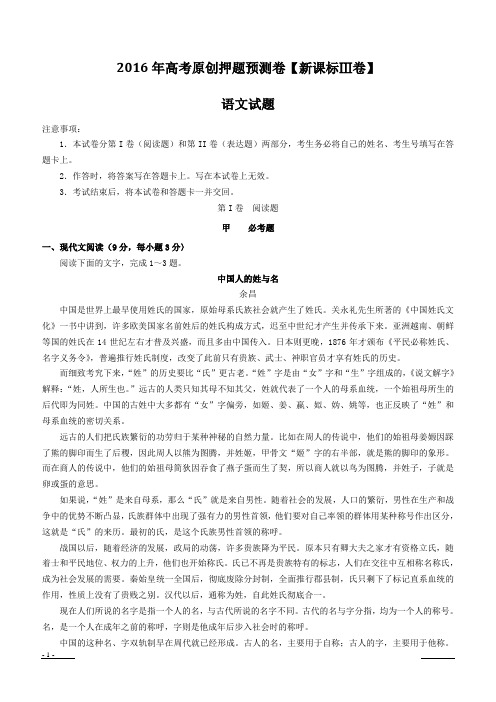
2016年高考原创押题预测卷【新课标Ⅲ卷】语文试题注意事项:1.本试卷分第I卷(阅读题)和第II卷(表达题)两部分,考生务必将自己的姓名、考生号填写在答题卡上。
2.作答时,将答案写在答题卡上。
写在本试卷上无效。
3.考试结束后,将本试卷和答题卡一并交回。
第I卷阅读题甲必考题一、现代文阅读(9分,毎小题3分〉阅读下面的文字,完成1~3题。
中国人的姓与名余昌中国是世界上最早使用姓氏的国家,原始母系氏族社会就产生了姓氏。
关永礼先生所著的《中国姓氏文化》一书中讲到,许多欧美国家名前姓后的姓氏构成方式,迟至中世纪才产生并传承下来。
亚洲越南、朝鲜等国的姓氏在14世纪左右才普及兴盛,而且多由中国传入。
日本则更晚,1876年才颁布《平民必称姓氏、名字义务令》,普遍推行姓氏制度,改变了此前只有贵族、武士、神职官员才享有姓氏的历史。
而细致考究下来,“姓”的历史要比“氏”更古老。
“姓”字是由“女”字和“生”字组成的,《说文解字》解释:“姓,人所生也。
”远古的人类只知其母不知其父,姓就代表了一个人的母系血统,一个始祖母所生的后代即为同姓。
中国的古姓中大多都有“女”字偏旁,如姬、姜、嬴、姒、妫、姚等,也正反映了“姓”和母系血统的密切关系。
远古的人们把氏族繁衍的功劳归于某种神秘的自然力量。
比如在周人的传说中,他们的始祖母姜嫄因踩了熊的脚印而生了后稷,因此周人以熊为图腾,并姓姬,甲骨文“姬”字的右半部,就是熊的脚印的象形。
而在商人的传说中,他们的始祖母简狄因吞食了燕子蛋而生了契,所以商人就以鸟为图腾,并姓子,子就是卵或蛋的意思。
如果说,“姓”是来自母系,那么“氏”就是来自男性。
随着社会的发展,人口的繁衍,男性在生产和战争中的优势不断凸显,氏族群体中出现了强有力的男性首领,他们要对自己率领的群体用某种称号作出区分,这就是“氏”的来历。
最初的氏,是这个氏族男性首领的称呼。
战国以后,随着经济的发展,政局的动荡,许多贵族降为平民。
原本只有卿大夫之家才有资格立氏,随着士和平民地位、权力的上升,他们也开始称氏。
2016高考语文全国新课标III卷(含答案)

2016年普通高等学校招生全国统一考试语文(新课标Ⅲ卷附答案)一、现代文阅读(9分,每小题3分)阅读下面的文字,完成1~3题。
文学中有历史。
当今历史学家大都认为,没有什么文献资料不是史料,不但文学作品,即如佛经、道藏、信札、家谱、账本、碑铭等也无一不是,而且随着史学研究领域的拓展,史料范围还在不断扩大。
从“三言二拍”里可以看到晚明市井生活的真实面貌,这对于研究社会史的人几乎是一个常识。
陈寅恪以诗证史,也为大家所熟悉。
但在“五四”以前,史料范围并非如此宽泛,文学作品在大多数史学家眼里也并非史料,有些文献到底属于文学还是史学,一两千年来都没有一致的看法。
神话传说就是如此,其中相当突出的例子是《山海经》。
神话传说是文学,史前时代,无文字可征,只有传说,暂当历史。
三皇五帝至今未曾坐实,但“炎皇子孙”已经成为口头语,甚至成为历史共识。
新的传说还会不断产生,能否成史颇为可疑,但以神话传说研究历史,却是一种重要的方法。
在历史上,《山海经》究竟应归于文学还是史学,曾是死结。
王国维《古史新证》说:“而疑古之过,乃并尧、舜、禹之人物而变疑之,其于怀疑之态度及批评之精神不无可取,然惜于在于史材料未尝为充分之处理也。
”这些古史材料就包括《山海经》《穆天子传》等文献。
在《汉书·艺文志》里,《山海经》列于数术类。
此后该书在目录学里的角色转换过几次,《隋书·经籍志》将《山海经》列于史部地理类,也就是将它看成史书了。
历史是讲真实的,《山海经》一般被视为荒诞不经,连司马迁写《史记》都不敢采用。
虽然《山海经》里平实的山川地理内容应归于史部,但其中大量的神话故事却显然有悖信史,所以清人编《四库全书》,言其“侈谈神怪,百无一真,是直小说之祖耳”,将其改列于子部小说家类。
这个死结直到“五四”以后才大致解开。
解开的途径有二:一是将《山海经》分而治之,不把它看作一部成于一人一时之书,神话归神话,历史归历史;二是神话中也有历史的成分在,仍可以之证史或补史。
2016年全国统一高考语文试卷及解析(新课标三)

2016年全国统一高考语文试卷(新课标Ⅲ)一、现代文阅读(9分,每小题9分)1.(9分)阅读下面的文字,完成1~3题。
文学中有历史。
当今历史学家大都认为,没有什么文献资料不是史料,不但文学作品,即如佛经、道藏、信札、家谱、账本、碑铭等也无一不是,而且随着史学研究领域的拓展,史料范围还在不断扩大。
从“三言二拍”里可以看到晚明市井生活的真实面貌,这对于研究社会史的人几乎是一个常识。
陈寅恪以诗证史,也为大家所熟悉。
但在“五四”以前,史料范围并非如此宽泛,文学作品在大多数史学家眼里也并非史料,有些文献到底属于文学还是史学,一两千年来都没有一致的看法。
神话传说就是如此,其中相当突出的例子是《山海经》。
神话传说是文学,史前时代,无文字可征,只有传说,暂当历史。
三皇五帝至今未曾坐实,但“炎皇子孙”已经成为口头语,甚至成为历史共识。
新的传说还会不断产生,能否成史颇为可疑,但以神话传说研究历史,却是一种重要的方法。
在历史上,《山海经》究竟应归于文学还是史学,曾是死结。
王国维《古史新证》说“而疑古之过,乃并尧、舜、禹之人物而变疑之,其于怀疑之态度及批评之精神不无可取,然惜于在于史材料未尝为充分之处理也。
”这些古史材料就包括《山海经》《穆天子传》等文献。
在《汉书•艺文志》里,《山海经》列于数术类。
此后该书在目录学里的角色转换过几次,《隋书•经籍志》将《山海经》列于史部地理类,也就是将它看成史书了。
历史是讲真实的,《山海经》一般被视为荒诞不经,连司马迁写《史记》都不敢采用。
虽然《山海经》里平实的山川地理内容应归于史部,但其中大量的神话故事却显然有悖信史,所以清人编《四库全书》,言其“侈谈神怪,百无一真,是直小说之祖耳”,将其改列于子部小说家类。
这个死结直到“五四”以后才大致解开。
解开的途径有二:一是将《山海经》分而治之,不把它看作一部成于一人一时之书,神话归神话,历史归历史;二是神话中也有历史的成分在,仍可以之证史或补史。
2016年高考原创押题预测卷 (新课标Ⅲ卷)物理(解析版) 含解析

2016年高考原创押题预测卷【新课标III卷】理科综合物理试题注意事项:1。
本试卷分第I卷(选择题)和第II卷(非选择题)两部分.答卷前,考生务必将自己的姓名、准考证号填写在本试卷和答题卡相应位置上。
2。
回答第I卷时,选出每小题答案后,用2B铅笔把答题卡上对应题目的答案标号涂黑。
如需改动,用橡皮擦干净后,再选涂其他答案标号。
写在本试卷上无效.3。
回答第II卷时,将答案写在答题卡上.写在本试卷上无效.4.考试结束后,将本试卷和答题卡一并交回.可能用到的相对原子质量:H—1 B-11 C—12 N-14 O—16 Mn—55 Fe-56第I卷二、选择题:本题共8个小题,每小题6分。
在每小题给出的四个选项中,第14~17题只有一项符合题目要求,第18~21题有多项符合题目要求。
全部选对的得6分,选对但不全的得3分,有选错的得0分.14.100米短跑是径赛中最精彩的项目之一.目前男子世界纪录为9.58 s,由牙买加的尤塞恩·博尔特于2009年8月16日在柏林世锦赛上创造。
博尔特在比赛中的运动图象可能是A B C D14。
【答案】B【考点】运动图象15.如图所示,固定的斜面上一个质量为m 的物块在沿斜面向下的拉力F 1作用下匀速下滑,在下滑过程中的某时刻对物块再施加一个竖直向上的恒力F 2,且F 2〈mg .则施加F 2后极短时间内物块的运动状态是A 。
仍匀速下滑B 。
匀加速下滑C 。
匀减速下滑 D.上述情况都有可能15。
【答案】B【解析】以物块为研究对象,施加F 2前物块受重力、拉力、支持力、滑动摩擦力作用,根据平衡条件有mg sin θ+ F 1=μmg cos θ,施加一个竖直向上的恒力F 2后,由牛顿第二定律有212()sin ()cos mg F F mg F ma θμθ-+--=,可得a =1220F F m g >,B 正确。
【考点】物体的平衡、牛顿第二定律16。
如图所示,P 、Q 两点处放置两个等量异种点电荷,P 、Q 连线的中点为O ,N 、 a 、b 是PQ 中垂线上的三点,且Oa =2Ob ,在N 点处放置一负点电荷,以无穷远处电势为零,则F 1mA。
2016年高考语文全国卷3试题及答案(精校免费)解析

2016年普通高等学校全国统一招生考试新课标Ⅲ卷语文试题一、现代文阅读(9分,每小题3分)阅读下面的文字,完成1~3题。
①文学中有历史。
当今历史学家大都认为,没有什么文献资料不是史料,不但文学作品,即如佛经、道藏、信札、家谱、账本、碑铭等也无一不是,而且随着史学研究领域的拓展,史料范围还在不断扩大。
从“三言二拍”里可以看到晚明市井生活的真实面貌,这对于研究社会史的人几乎是一个常识。
陈寅恪以诗证史,也为大家所熟悉。
但在“五四”以前,史料范围并非如此宽泛,文学作品在大多数史学家眼里也并非史料,有些文献到底属于文学还是史学,一两千年来都没有一致的看法。
神话传说就是如此,其中相当突出的例子是《山海经》。
②神话传说是文学,史前时代,无文字可征,只有传说,暂当历史。
三皇五帝至今未曾坐实,但“炎皇子孙”已经成为口头语,甚至成为历史共识。
新的传说还会不断产生,能否成史颇为可疑,但以神话传说研究历史,却是一种重要的方法。
在历史上,《山海经》究竟应归于文学还是史学,曾是死结。
王国维《古史新证》说“而疑古之过,乃并尧、舜、禹之人物而变疑之,其于怀疑之态度及批评之精神不无可取,然惜于在于史材料未尝为充分之处理也。
”这些古史材料就包括《山海经》《穆天子传》等文献。
在《汉书·艺文志》里,《山海经》列于数术类。
此后该书在目录学里的角色转换过几次,《隋书·经籍志》将《山海经》列于史部地理类,也就是将它看成史书了。
③历史是讲真实的,《山海经》一般被视为荒诞不经,连司马迁写《史记》都不敢采用。
虽然《山海经》里平实的山川地理内容应归于史部,但其中大量的神话故事却显然有悖信史,所以清人编《四库全书》,言其“侈谈神怪,百无一真,是直小说之祖耳”,将其改列于子部小说家类。
这个死结直到“五四”以后才大致解开。
解开的途径有二:一是将《山海经》分而治之,不把它看作一部成于一人一时之书,神话归神话,历史归历史;二是神话中也有历史的成分在,仍可以之证史或补史。
2016年全国统一高考英语试卷(新课标ⅲ)(含解析版)(1)
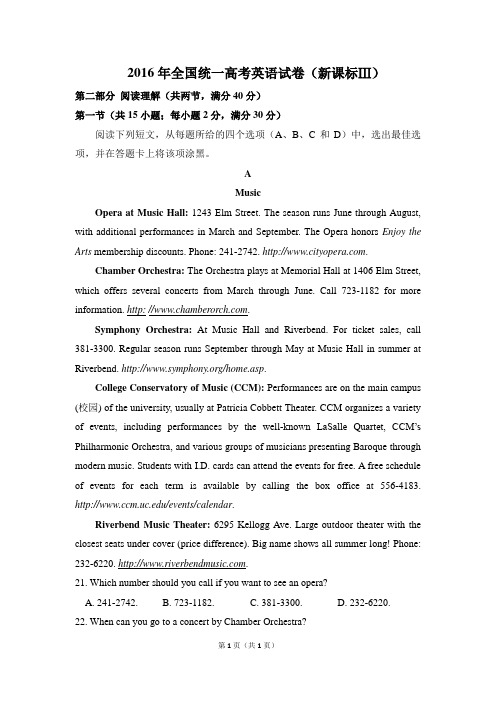
2016年全国统一高考英语试卷(新课标Ⅲ)第二部分阅读理解(共两节,满分40分)第一节(共15小题;每小题2分,满分30分)阅读下列短文,从每题所给的四个选项(A、B、C和D)中,选出最佳选项,并在答题卡上将该项涂黑。
AMusicOpera at Music Hall: 1243 Elm Street. The season runs June through August, with additional performances in March and September. The Opera honors Enjoy the Arts membership discounts. Phone: 241-2742. .Chamber Orchestra: The Orchestra plays at Memorial Hall at 1406 Elm Street, which offers several concerts from March through June. Call 723-1182 for more information. .Symphony Orchestra: At Music Hall and Riverbend. For ticket sales, call 381-3300. Regular season runs September through May at Music Hall in summer at Riverbend. /home.asp.College Conservatory of Music (CCM): Performances are on the main campus (校园) of the university, usually at Patricia Cobbett Theater. CCM organizes a variety of events, including performances by the well-known LaSalle Quartet, CCM’s Philharmonic Orchestra, and various groups of musicians presenting Baroque through modern music. Students with I.D. cards can attend the events for free. A free schedule of events for each term is available by calling the box office at 556-4183. /events/calendar.Riverbend Music Theater: 6295 Kellogg Ave. Large outdoor theater with the closest seats under cover (price difference). Big name shows all summer long! Phone: 232-6220. .21. Which number should you call if you want to see an opera?A. 241-2742.B. 723-1182.C. 381-3300.D. 232-6220.22. When can you go to a concert by Chamber Orchestra?A. February.B. May.C. August.D. November.23. Where can students go for free performances with their I.D. cards?A. Music Hall.B. Memorial Hall.C. Patricia Cobbett Theater.D. Riverbend Music Theater.24. How is Riverbend Music Theater different from the other places?A. It has seats in the open air.B. It gives shows all year round.C. It offers membership discounts.D. It presents famous musical works.BOn one of her trips to New York several years ago, Eudora Welty decided to take a couple of New York friends out to dinner. They settled in at a comfortable East Side cafe and within minutes, another customer was approaching their table.“Hey, aren’t you from Mississippi?” the elegant, white-haired writer remembered being asked by the stranger. “I’m from Mississippi too.”Without a second thought, the woman joined the Welty party. When her dinner partner showed up, she also pulled up a chair.“They began telling me all the news of Mississippi,” Welty said. “I didn’t know what my New York friends were thinking.”Taxis on a rainy New York night are rarer than sunshine. By the time the group got up to leave, it was pouring outside. Welty’s new friends immediately sent a waiter to find a cab. Heading back downtown toward her hotel, her big-city friends were amazed at the turn of events that had changed their Big Apple dinner into a Mississippi state reunion (团聚).“My friends said: ‘Now we believe your stories,’” Welty added. “And I said: ‘Now you know. These are t he people that make me write them.’”Sitting on a sofa in her room, Welty, a slim figure in a simple gray dress, looked pleased with this explanation.“I don’t make them up,” she said of the characters in her fiction these last 50 or so years. “I don’t have to.”Beauticians, bartenders, piano players and people with purple hats, Welty’speople come from afternoons spent visiting with old friends, from walks through the streets of her native Jackson, Miss., from conversations overheard on a bus. It annoys Welty that, at 78, her left ear has now given out. Sometimes, sitting on a bus or a train, she hears only a fragment (片段) of a particularly interesting story.25. What happened when Welty was with her friends at the cafe?A. Two strangers joined her.B. Her childhood friends came in.C. A heavy rain ruined the dinner.D. Some people held a party there.26. The underlined word “them” in Paragraph 6 refers to Welty’s .A. readersB. partiesC. friendsD. stories27. What can we learn about the characters in Welty’s fiction?A. They live in big cities.B. They are mostly women.C. They come from real life.D. They are pleasure seekers.CIf you are a fruit grower — or would like to become one — take advantage of Apple Day to see what’s around. It’s called Apple Day but in practice it’s more like Apple Month. The day itself is on October 21, but since it has caught on, events now spread out over most of October around Britain.Visiting an apple event is a good chance to see, and often taste, a wide variety of apples. To people who are used to the limited choice of apples such as Golden Delicious and Royal Gala in supermarkets, it can be quite an eye opener to see the range of classical apples still in existence, such as Decio which was grown by the Romans. Although it doesn’t taste of anything special, it’s still worth a try, as is the knobbly (多疙瘩的) Cat’s Head which is more of a curiosity than anything else.There are also varieties developed to suit specific local conditions. One of the very best varieties for eating quality is Orleans Reinette, but you’ll need a warm, sheltered place with perfect soil to grow it, so it’s a pipe dream for most apple lovers who fall for it.At the events, you can meet expert growers and discuss which ones will best suit your conditions, and because these are family affairs, children are well catered forwith apple-themed fun and games.Apple Days are being held at all sorts of places with an interest in fruit, including stately gardens and commercial orchards (果园). If you want to have a real orchard experience, try visiting the National Fruit Collection at Brogdale, near Faversham in Kent.28. What can people do at the apple events?A. Attend experts’ lectures.B. Visit fruit-loving families.C. Plant fruit trees in an orchard.D. Taste many kinds of apples.29. What can we learn about Decio?A. It is a new variety.B. It has a strange look.C. It is rarely seen now.D. It has a special taste.30. What does the underlined phrase “a pipe dream” in Paragraph 3 mean?A. A practical idea.B. A vain hope.C. A brilliant plan.D. A selfish desire.31. What is the author’s purpose in writing the text?A. To show how to grow apples.B. To introduce an apple festival.C. To help people select apples.D. To promote apple research.DBad news sells. If it bleeds, it leads. No news is good news, and good news is no news. Those are the classic rules for the evening broadcasts and the morning papers. But now that information is being spread and monitored (监控) in different ways, researchers are discovering new rules. By tracking people’s e-mails and online posts, scientists have found that good news can spread faster and farther than disasters and sob stories.“The ‘if it bleeds’ rule works for mass media,” says Jonah Berger, a scholar at the University of Pennsylvania. “They want your eyeballs and don’t care how you’re feeling. But when you share a story with your friends, you care a lot more how they react. You don’t want them to think of you as a Debbie Downer.”Researchers analyzing word-of-mouth communication — e-mails, Web posts and reviews, face-to-face conversations — found that it tended to be more positive thannegative (消极的), but that didn’t necessarily mean people preferred positive news. Was positive news shared more often simply because people experienced more good things than bad things? To test for that possibility, Dr. Berger looked at how people spread a parti cular set of news stories: thousands of articles on The New York Times’ website. He and a Penn colleague analyzed the “most e-mailed” list for six months. One of his first findings was that articles in the science section were much more likely to make the list than non-science articles. He found that science amazed Times’ readers and made them want to share this positive feeling with others.Readers also tended to share articles that were exciting or funny, or that inspired negative feelings like anger or anxiety, but not articles that left them merely sad. They needed to be aroused (激发) one way or the other, and they preferred good news to bad. The more positive an article, the more likely it was to be shared, as Dr. Berger explains in his new book, “Contagious: Why Things Catch On.”32. What do the classic rules mentioned in the text apply to?A. News reports.B. Research papers.C. Private e-mails.D. Daily conversations.33. What can we infer about people like Debbie Downer?A. They’re so cially inactive.B. They’re good at telling stories.C. They’re inconsiderate of others.D. They’re careful with their words.34. Which tended to be the most e-mailed according to Dr. Berger’s research?A. Sports news.B. Science articles.C. Personal accounts.D. Financial reviews.35. What can be a suitable title for the text?A. Sad Stories Travel Far and WideB .Online News Attracts More PeopleC. Reading Habits Change with the TimesD. Good News Beats Bad on Social Networks第二节(共5小题;每小题2分,满分10分)根据短文内容,从短文后的选项中选出能填入空白处的最佳选项。
2016年语文高考试题全国卷3(含答案)

2016年普通高等学校全国统一招生考试新课标Ⅲ卷语文试题一、现代文阅读(9分,每小题3分)阅读下面的文字,完成1~3题。
文学中有历史。
当今历史学家大都认为,没有什么文献资料不是史料,不但文学作品,即如佛经、道藏、信札、家谱、账本、碑铭等也无一不是,而且随着史学研究领域的拓展,史料范围还在不断扩大。
从“三言二拍”里可以看到晚明市井生活的真实面貌,这对于研究社会史的人几乎是一个常识。
陈寅恪以诗证史,也为大家所熟悉。
但在“五四”以前,史料范围并非如此宽泛,文学作品在大多数史学家眼里也并非史料,有些文献到底属于文学还是史学,一两千年来都没有一致的看法。
神话传说就是如此,其中相当突出的例子是《山海经》。
神话传说是文学,史前时代,无文字可征,只有传说,暂当历史。
三皇五帝至今未曾坐实,但“炎皇子孙”已经成为口头语,甚至成为历史共识。
新的传说还会不断产生,能否成史颇为可疑,但以神话传说研究历史,却是一种重要的方法。
在历史上,《山海经》究竟应归于文学还是史学,曾是死结。
王国维《古史新证》说“而疑古之过,乃并尧、舜、禹之人物而变疑之,其于怀疑之态度及批评之精神不无可取,然惜于在于史材料未尝为充分之处理也。
”这些古史材料就包括《山海经》《穆天子传》等文献。
在《汉书·艺文志》里,《山海经》列于数术类。
此后该书在目录学里的角色转换过几次,《隋书·经籍志》将《山海经》列于史部地理类,也就是将它看成史书了。
历史是讲真实的,《山海经》一般被视为荒诞不经,连司马迁写《史记》都不敢采用。
虽然《山海经》里平实的山川地理内容应归于史部,但其中大量的神话故事却显然有悖信史,所以清人编《四库全书》,言其“侈谈神怪,百无一真,是直小说之祖耳”,将其改列于子部小说家类。
这个死结直到“五四”以后才大致解开。
解开的途径有二:一是将《山海经》分而治之,不把它看作一部成于一人一时之书,神话归神话,历史归历史;二是神话中也有历史的成分在,仍可以之证史或补史。
新课标卷Ⅲ理2016高考真题新课标答案
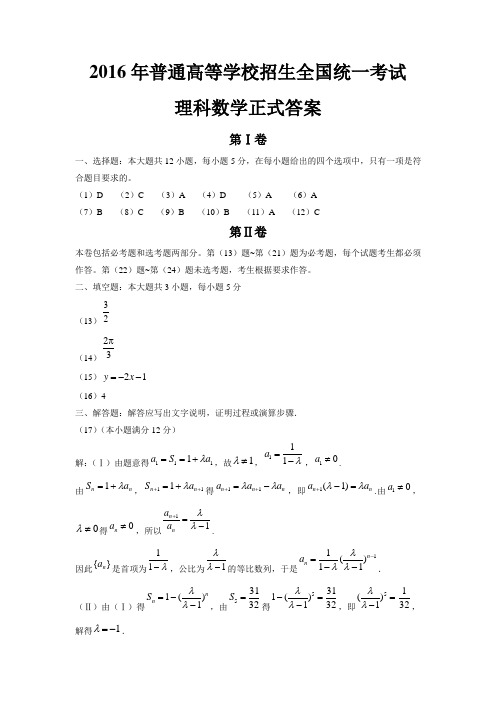
2016年普通高等学校招生全国统一考试理科数学正式答案第Ⅰ卷一、选择题:本大题共12小题,每小题5分,在每小题给出的四个选项中,只有一项是符合题目要求的。
(1)D (2)C (3)A (4)D (5)A (6)A (7)B (8)C (9)B (10)B (11)A (12)C第Ⅱ卷本卷包括必考题和选考题两部分。
第(13)题~第(21)题为必考题,每个试题考生都必须作答。
第(22)题~第(24)题未选考题,考生根据要求作答。
二、填空题:本大题共3小题,每小题5分(13)32 (14)32π(15)21y x =-- (16)4三、解答题:解答应写出文字说明,证明过程或演算步骤. (17)(本小题满分12分)解:(Ⅰ)由题意得1111a S a λ+==,故1≠λ,λ-=111a ,01≠a .由n n a S λ+=1,111+++=n n a S λ得n n n a a a λλ-=++11,即n n a a λλ=-+)1(1.由01≠a ,0≠λ得0≠n a ,所以11-=+λλnn a a . 因此}{n a 是首项为λ-11,公比为1-λλ的等比数列,于是1)1(11---=n n a λλλ.(Ⅱ)由(Ⅰ)得nn S )1(1--=λλ,由32315=S 得3231)1(15=--λλ,即=-5)1(λλ321, 解得1λ=-.(18)(本小题满分12分)解:(Ⅰ)由折线图这数据和附注中参考数据得4=t ,28)(712=-∑=i i t t ,55.0)(712=-∑=i i y y ,89.232.9417.40))((717171=⨯-=-=--∑∑∑===i i ii i i i iyt y t y y t t,99.0646.2255.089.2≈⨯⨯≈r .因为y 与t 的相关系数近似为0.99,说明y 与t 的线性相关相当高,从而可以用线性回归模型拟合y 与t 的关系.所以,y 关于t 的回归方程为:t y 10.092.0ˆ+=.将2016年对应的t=9代入回归方程得:82.1910.092.0ˆ=⨯+=y . 所以预测2016年我国生活垃圾无害化处理量将约1.82亿吨. (19)(本小题满分12分)解:(Ⅰ)由已知得232==AD AM ,取BP 的中点T ,连接AT ,TN ,由N 为PC 中点知BC TN //,221==BC TN .又BC AD //,故TN 平行且等于AM ,四边形AMNT 为平行四边形,于是AT MN //. 因为⊂AT 平面PAB ,⊄MN 平面PAB ,所以//MN 平面PAB .(Ⅱ)取BC 的中点E ,连结AE ,由AC AB =得BC AE ⊥,从而AD AE ⊥,且5)2(2222=-=-=BC AB BE AB AE .以A 为坐标原点,AE 的方向为x 轴正方向,建立如图所示的空间直角坐标系xyz A -,由题意知,)4,0,0(P ,)0,2,0(M ,)0,2,5(C ,)2,1,25(N ,)4,2,0(-=PM ,)2,1,25(-=PN ,)2,1,25(=AN .设),,(z y x =为平面PMN 的法向量,则⎪⎩⎪⎨⎧=⋅=⋅00PN n PM n,即24020y z x y z -=⎧+-=,可取)1,2,0(=,于是2558|||||,cos |==><AN n AN n AN n .(20)解:由题设)0,21(F .设b y l a y l ==:,:21,则0≠ab ,且 22111(,a),(,),(,),(,),(,)222222a b a bA B b P a Q b R +---.记过B A ,两点的直线为l ,则l 的方程为0)(2=++-ab y b a x . .....3分 (Ⅰ)由于F 在线段AB 上,故01=+ab . 记AR 的斜率为1k ,FQ 的斜率为2k ,则222111k b aaba ab a b a a b a k =-=-==--=+-=. 所以FQ AR ∥. ......5分 (Ⅱ)设l 与x 轴的交点为)0,(1x D ,则2,2121211b a S x a b FD a b S PQF ABF -=--=-=∆∆.由题设可得221211b a x a b -=--,所以01=x (舍去),11=x .设满足条件的AB 的中点为),(y x E .当AB 与x 轴不垂直时,由DE ABk k =可得)1(12≠-=+x x yb a .而y ba =+2,所以)1(12≠-=x x y . 当AB 与x 轴垂直时,E 与D 重合.所以,所求轨迹方程为12-=x y . ....12分 (21)(本小题满分12分)解:(Ⅰ)'()2sin 2(1)sin f x a x a x =---. (Ⅱ)当1a ≥时,'|()||sin 2(1)(cos 1)|f x a x a x =+-+2(1)a a ≤+-32a =-(0)f = 因此,32A a =-. ………4分当01a <<时,将()f x 变形为2()2cos (1)cos 1f x a x a x =+--.令2()2(1)1g t at a t =+--,则A 是|()|g t 在[1,1]-上的最大值,(1)g a -=,(1)32g a =-,且当14a t a -=时,()g t 取得极小值,极小值为221(1)61()1488a a a a g a a a --++=--=-. 令1114a a --<<,解得13a <-(舍去),15a >. (ⅰ)当105a <≤时,()g t 在(1,1)-内无极值点,|(1)|g a -=,|(1)|23g a =-,|(1)||(1)|g g -<,所以23A a =-.(ⅱ)当115a <<时,由(1)(1)2(1)0g g a --=->,知1(1)(1)()4a g g g a -->>.又1(1)(17)|()||(1)|048a a a g g a a --+--=>,所以2161|()|48a a a A g a a -++==.(Ⅲ)由(Ⅰ)得'|()||2sin 2(1)sin |2|1|f x a x a x a a =---≤+-. 当105a <≤时,'|()|1242(23)2f x a a a A ≤+≤-<-=.当115a <<时,131884a A a =++≥,所以'|()|12f x a A ≤+<. 当1a ≥时,'|()|31642f x a a A ≤-≤-=,所以'|()|2f x A ≤. 请考生在[22]、[23]、[24]题中任选一题作答。
2016年全国统一高考语文试卷(新课标ⅲ)(含解析版)
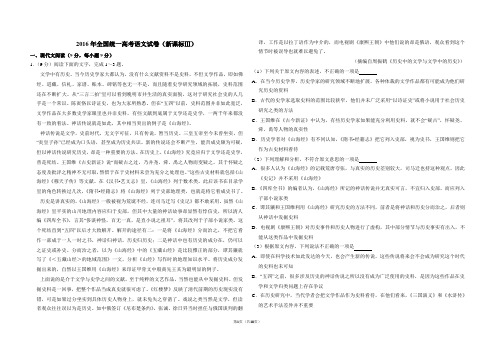
2016年全国统一高考语文试卷(新课标Ⅲ)一、现代文阅读(9分,每小题9分)1.(9分)阅读下面的文字,完成1~3题。
文学中有历史。
当今历史学家大都认为,没有什么文献资料不是史料,不但文学作品,即如佛经、道藏、信札、家谱、账本、碑铭等也无一不是,而且随着史学研究领域的拓展,史料范围还在不断扩大。
从“三言二拍”里可以看到晚明市井生活的真实面貌,这对于研究社会史的人几乎是一个常识。
陈寅恪以诗证史,也为大家所熟悉。
但在“五四”以前,史料范围并非如此宽泛,文学作品在大多数史学家眼里也并非史料,有些文献到底属于文学还是史学,一两千年来都没有一致的看法。
神话传说就是如此,其中相当突出的例子是《山海经》。
神话传说是文学,史前时代,无文字可征,只有传说,暂当历史。
三皇五帝至今未曾坐实,但“炎皇子孙”已经成为口头语,甚至成为历史共识。
新的传说还会不断产生,能否成史颇为可疑,但以神话传说研究历史,却是一种重要的方法。
在历史上,《山海经》究竟应归于文学还是史学,曾是死结。
王国维《古史新证》说“而疑古之过,乃并尧、舜、禹之人物而变疑之,其于怀疑之态度及批评之精神不无可取,然惜于在于史材料未尝为充分之处理也。
”这些古史材料就包括《山海经》《穆天子传》等文献。
在《汉书•艺文志》里,《山海经》列于数术类。
此后该书在目录学里的角色转换过几次,《隋书•经籍志》将《山海经》列于史部地理类,也就是将它看成史书了。
历史是讲真实的,《山海经》一般被视为荒诞不经,连司马迁写《史记》都不敢采用。
虽然《山海经》里平实的山川地理内容应归于史部,但其中大量的神话故事却显然有悖信史,所以清人编《四库全书》,言其“侈谈神怪,百无一真,是直小说之祖耳”,将其改列于子部小说家类。
这个死结直到“五四”以后才大致解开。
解开的途径有二:一是将《山海经》分而治之,不把它看作一部成于一人一时之书,神话归神话,历史归历史;二是神话中也有历史的成分在,仍可以之证史或补史。
2016年英语高考新课标III卷(完美版,含答案)

绝密★启封前2016年普通高等学校全国统一考试(新课标全国卷III)英语第二部分阅读理解(共两节,满分40分)第一节(共15小题:每小题2分,满分30分)阅读下列短文,从每题所给的四个选项(A、B、C和D)中选出最佳选项,并在答题卡上将该项涂黑。
AMusicOpera at Music Hall: 1243 Elm Street. The season runs June through August, with additional performances in March and September. The Opera honors Enjoy the Arts membership discounts. Phone: 241-2742. .Chamber Orchestra: The Orchestra plays at Memorial Hall at 1406 Elm Street, which offers several concerts from March through June. Call 723-1182 for more information. .Symphony Orchestra: At Music Hall and Riverbend. For ticket sales, call 381-3300. Regular season runs September through May at Music Hall in summer at Riverbend. /home.asp.College Conservatory of Music (CCM): Performances are on the main campus(校园) of the university, usually at Patricia Cobbett Theater. CCM organizes a variety of events, including performances by the well-known LaSalle Quartet, CCM’s Philharmonic Orchestra, and various groups of musicians presenting Baroque through modern music. Students with I.D. cards can attend the events for free. A free schedule of events for each term is available by calling the box office at 556-4183. /events/calendar.Riverbend Music Theater: 6295 Kellogg Ave. Large outdoor theater with the closest seats under cover (price difference).Big name shows all summer long! Phone:232-6220. .21.Which number should you call if you want to see an opera?A. 241-2742.B. 723-1182.C. 381-3300.D. 232-6220.22. When can you go to a concert by Chamber Orchestra?A. February.B. May.C. August.D. November.23. Where can students go for free performances with their I.D. cards?A. Music Hall.B. Memorial Hall.C. Patricia Cobbett Theater.D. Riverbend Music Theater.24. How is Riverbend Music Theater different from the other places?A. It has seats in the open air.B. It gives shows all year round.C. It offers membership discounts.D. It presents famous musical works.BOn one of her trips to New York several years ago, Eudora Welty decided to take a couple of New York friends out to dinner. They settled in at a comfortable East Side cafe and within minutes, another customer was approaching their table.“Hey, aren’t you from Mississippi?” the elegant, white-haired writer remembered being asked by the stranger.“I’m from Mississippi too.”Without a second thought, the woman joined the Welty party. When her dinner partner showed up, she also pulled up a chair.“They began telling me all the news of Mississippi,” Welty said. “I didn’t know what my New York friends were thinking.”Taxis on a rainy New York night are rarer than sunshine. By the time the group got up to leave, it was pouring outside. Welty’s new friends immediately sent a waiter to find a cab. Heading back downtown toward her hotel, her big-city friends were amazed at the turn of events that had changed their Big Apple dinner into a Mississippi.“My friends said: ‘Now we believe your stories,’” Welty added. “And I said: ‘Now you know. These are the people that make me write them.’”Sitting on a sofa in her room, Welty, a slim figure in a simple gray dress, looked pleased with this explanation.“I don’t make them up,” she said of the characters in her fiction these last 50 or so years. “I don’t have to.”Beauticians, bartenders, piano players and people with purple hats, Welty’s people come from afternoons spent visiting with old friends, from walks through the streets of her native Jackson, Miss., from conversations overheard on a bus. It annoys Welty that, at 78, her left ear has now given out. Sometimes, sitting on a bus or a train, she hears only a fragment(片段) of a particularly interesting story.25. What happened when Welty was with her friends at the cafe?A. Two strangers joined her.B. Her childhood friends came in.C. A heavy rain ruined the dinner.D. Some people held a party there.26. The underlined word “them” in Paragraph 6 refers to Welty’s .A. readersB. partiesC. friendsD. stories27. What can we learn about the characters in Welty’s fiction?A. They live in big cities.B. They are mostly women.C. They come from real life.D. They are pleasure seekers.CIf you are a fruit grower—or would like to become one—take advantage of Apple Day to see what’s around. It’s called Apple Day but in practice it’s more like Apple Month. The day itself is on October 21, but since it has caught on, events now spread out over most of October around Britain.Visiting an apple event is a good chance to see, and often taste, a wide variety of apples. To people who are used to the limited choice of apples such as Golden Delicious and Royal Gala in supermarkets, it can be quite an eye opener to see the range of classical apples still in existence, such as Decio which was grown by the Romans. Although it doesn’t taste of anything special, it’s still worth a try, as is the knobbly(多疙瘩的) Cat’s Head which is more of a curiosity than anything else.There are also varieties developed to suit specific local conditions. One of the very best varieties for eating quality is Orleans Reinette, but you’ll need a warm, sheltered place with perfect soil to grow it, so it’s a pipe dream for most apple lovers who fall for it.At the events, you can meet expert growers and discuss which ones will best suit your conditions, and becausethese are family affairs, children are well catered for with apple-themed fun and games.Apple Days are being held at all sorts of places with an interest in fruit, including stately gardens and commercial orchards(果园).If you want to have a real orchard experience, try visiting the National Fruit Collection at Brogdale, near Faversham in Kent.28. What can people do at the apple events?A. Attend experts’ lectures.B. Visit fruit-loving families.C. Plant fruit trees in an orchard.D. Taste many kinds of apples.29. What can we learn about Decio?A. It is a new variety.B. It has a strange look.C. It is rarely seen now.D. It has a special taste.30. What does the underlined phrase “a pipe dream” in Paragraph 3mean?A. A practical idea.B. A vain hope.C.A brilliant plan.D. A selfish desire.31. What is the aut hor’s p urpose in writing the text?A. To show how to grow apples. B .To introduce an apple festival.C. To help people select apples.D. To promote apple research.DBad news sells. If it bleeds, it leads. No news is good news, and good news is no news. Those are the classic rules for the evening broadcasts and the morning papers. But now that information is being spread and monitored(监控) in different ways, researchers are discovering new rules. By tracking people’s e-mails and online posts, scientists have found that good news can spread faster and farther than disasters and sob stories.“The ‘if it bleeds’ rule works for mass media,” says Jonah Berger, a scholar at the University of Pennsylvania. “They want your eyeballs and don’t care how you’re fe eling. But when you share a story with your friends, you care a lot more how they react. You don’t want them to think of you as a Debbie Downer.”Researchers analyzing word-of-mouth communication—e-mails, Web posts and reviews, face-to-face conversations—found that it tended to be more positive than negative(消极的), but that didn’t necessarily mean people preferred positive news. Was positive news shared more often simply because people experienced more good things than bad things? To test for that possibility, Dr. Berger looked at how people spread a particular set of news stories: thousands of articles on The New York Times’ website. He and a Penn colleague analyzed the “most e-mailed” list for six months. One of his first find ings was that articles in the science section were much more likely to make the list than non-science articles. He found that science amazed Times’ readers and made them want to share this positive feeling with others.Readers also tended to share articles that were exciting or funny, or that inspired negative feelings like anger or anxiety, but not articles that left them merely sad. They needed to be aroused(激发) one way or the other, and they preferred good news to bad. The more positive an article, the more likely it was to be shared, as Dr. Berger explains in his new book, “Contagious: Why Things Catch On.”32 .What do the classic rules mentioned in the text apply to?A. News reports.B. Research papers.C. Private e-mails.D. Daily conversations.33. What can we infer about people like Debbie Downer?A. They’re socially inactive.B. They’re good at telling stories.C. They’re inconsiderate of others.D. They’re careful with their words.34.Which tended to be the most e-mailed according to Dr. Berger’s research?A . Sports new. B. Science articles.C. Personal accounts.D. Financial reviews.35. What can be a suitable title for the text?A. Sad Stories Travel Far and Wide B .Online News Attracts More PeopleC. Reading Habits Change with the TimesD. Good News Beats Bad on Social Networks第二节(共5小题,每小题2分,满分10分)根据短文内容,从短文后的选项中选出能填入空白处的最佳选项,选项中有两项为多余选项。
